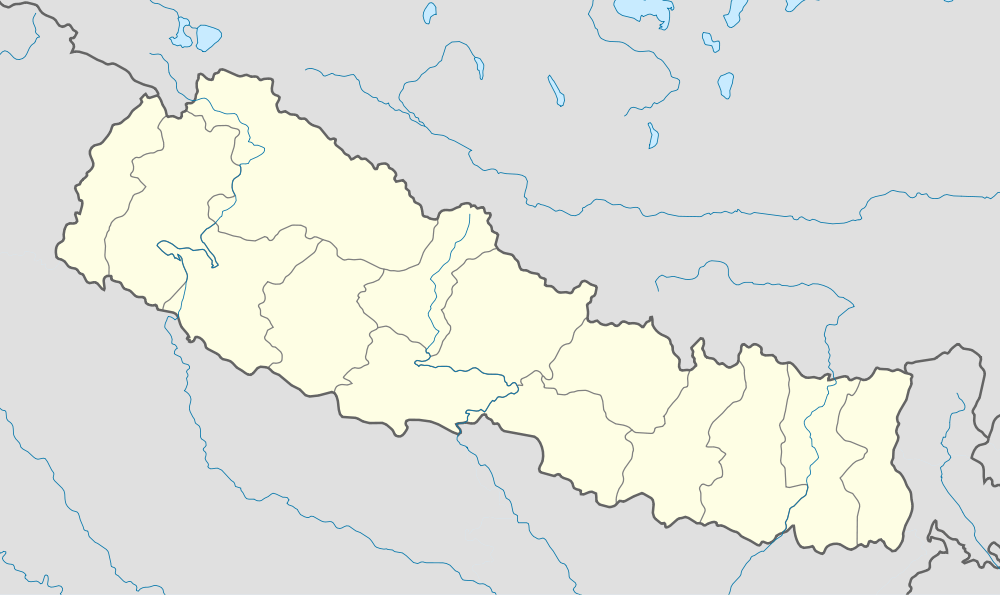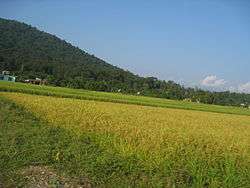Gaindakot Municipality
| Gaindakot गैंडाकोट नगरपालिका | |
|---|---|
| Municipality | |
 Gaindakot Location in Nepal | |
| Coordinates: 27°44′N 84°23′E / 27.73°N 84.39°ECoordinates: 27°44′N 84°23′E / 27.73°N 84.39°E | |
| Country |
|
| Zone | Lumbini Zone |
| District | Nawalparasi District |
| Area | |
| • Total | 101.8 km2 (39.3 sq mi) |
| Population (2011) | |
| • Total | 55,205 [1] |
| • Density | 542.29/km2 (1,404.5/sq mi) |
| Time zone | NST (UTC+5:45) |
| Postal code | 33003 |
| Area code(s) | 078 |
| Website | www.gaindakotmun.gov.np |
Gaindakot (Nepali: गैंडाकोट; sometimes spelled Gaidakot) is a municipality in Nawalparasi District in the Lumbini Zone of southern Nepal. It became a municipality in May 2014 by merging the existing Mukundapur, Amarapuri, and Gaindakot VDCs.[2][3] It is situated on the shore of Narayani River in the lap of Maula Kalika temple. At the time of the 2011 Nepal census, it had a population of 55,205 and 13,024 individual households according to 2011 Nepal census.[4]
Media
To promote local culture, Gaindakot has one FM radio station Vijaya FM[5] – 101.6 MHz which is a Community radio station. MTV Mukundasen TV, the first channel of Gaindakot, is broadcast from here.
Tourist Attractions
Maula Kalika
Gaindakot is famous nationwide for Maula Kalika temple and for Maula hill hiking. The temple is situated at the top of the Maula hill mountain (approx 561 m above sea level) where people climb around 2 km long trail. Maula Kalika is popular for its 360-degree panoramic view of the entire Chitwan including Chitwan National Park on the south and Mt. Manaslu and Kaligandaki river on the north. The temple is famous for sunrise view also. Many high-ranking officials of Nepal, including presidents, former kings and foreign dignitaries, have visited the temple. Dasain (Vijaya dashami or Bada Dasain) festival in Sept–October and in March–April (Chaite Dasain) are peak seasons. Maula Kalika is the symbol of Hindu goddess Kali or Kalika is associated with eternal energy, the symbol of power, harmony and new beginning. The attractive view of narayani river and many houses can be seen from there.
Dhodeni
Dhodeni is located on the northern part of Gaindakot's hilly area sand-witched by two mountains at an altitude of about 300 m from sea level. Dhodeni is populated by Gurung, Magar and some Kumal tribes within few hundred houses. Dhodeni is widely popular for traditional dance and party events during festive seasons around October.
Narayani River
Kaligandaki river and Narayani River flows north, east and south of Gaindakot. Narayani river is the deepest and also one of the biggest rivers of Nepal. The Narayani Bridge over the river connects Chitwan District with Nawalparasi District of Nepal. Small islands, like Nagarban in Narayani river are popular picnic spots. Eastern side of the Narayani river bank in Gaindakot is regarded as the holy site for Hindu rituals and well as a playground for school children. For long time Narayani river had been a life-line of Gaindakot as the main source of drinking water supply irrespective of the season and water quality until the late 1990s.
A lot of people walk over Narayani Bridge for cool evening air and scenic sunset view.

Narayangadh
Narayangadh in Bharatpur city( not a part of Gaindakot), is the main shopping and commercial area for Gaindakot residents. Is the main transit point for all the vehicles traveling via east-west Mahendra Highway and also for the people traveling from Kathmandu, Gorkha, and Pokhara through Mugling road. Devghat is an important religious site for elderly people of Gaindakot.
Recently, Narayangadh has become a retail and commercial capital of whole Chitwan district and Bharatpur Municipality. It is also the center for hospitality industry which includes Hotels, Lodges, Restaurants etc. and transportation hub for Chitwan district.
One has to travel through the Narayani Bridge to connect Narayanghat and Gaindakot.
Lumbini
Gaindakot is an entry point of Lumbini (not a part of Gaindakot) on the eastern side of the Lumbini Zone. Lumbini, the birthplace of Lord Buddha in Nepal, a World Heritage Site, is situated about 130 km. west of Gaindakot. Lumbini is also the administrative zone of Gaindakot Municipality.It is visited by many tourist
Chitwan National Park
Nearby Chitwan National Park, a World Heritage Site ( not a part of Gaindakot), is home to one horn rhino's, elephants, royal Bengal tigers, crocodiles, deers and many other wild animals. It is the third largest tourist destination in Nepal after Kathmandu and Pokhara. Gaindakot's name is derived from the rhino, as rhino's are said to be once dominating Gaindakot plains until the mid 20th century.
Education
Literacy
More than 68% people are literate.
Schools & Colleges and Educators
There are several schools in this small town, educating thousands of children. A mix of government, private and community based education institutions are in operation. The academic performance is fairly high. Senior teachers are active. Besides this, a lot of students go to Schools in Chitwan as well.
- Bal Bikash English Boarding School
- Continental English Boarding School
- Gaindakot English School
- Janak Higher Secondary School
- Kalika Higher Secondary School]
- Namuna Higher Secondary School
- Oxford college of engineering and management, Gaindakot
- Shree Saraswati Niketan Higher Secondary Boarding School
- Secret Hearts
- Shining English Boarding School
- Shree Janak College
- Shree Nepal Rashtriya Shamsher Adarsha Secondary School, Formerly Jaujuwa School
- Smile Kids Pre Monteshwari
- Surya Bhakta Patana Devi Memorial College
- Trimurti Vidhaya Sadan
- Vijaya Community Higher Secondary School
Financial office
There are few banks and cooperatives in serving the banking needs of local communities and to the residents of Nawalparasi District.
- Gaindakot Saving and Credit Co-operative Society Ltd
- VYCCU savings and credit co-operative ltd
- Gaindakot Development Bank
- Rising Development Bank
- Rastriya Banijya Bank
- Gaindakot Bikash Bitiya Shanstha Ltd.
- paribartan saving and co-operative
- Aama Saving and Credit co-operative Ltd
- IME Center kaligandaki chowk, Gaindakot-2
Western Union Money transfer services is also available in Gaindakot. People mostly rely on banking and financial services available in Narayangarh, Chitwan that has about 40 Banks and Financial Institutions.
Agriculture

Gaindakot's plain land is suitable for agriculture. Rice, wheat, mustard, corn, millet, and potato are among the crops grown across the seasons in Gaindakot.
The land on the northern area of East-West national highway before the hilly area is traditionally used for farming due to the better irrigation system. Farmers and peasants in Gaindakot are reliable on monsoon season as the most efficient irrigation source.
A small irrigation dam is located on the way toward Dhodeni, north of Ranital. Farming in Gaindakot is non-dependent on modern farm equipment except tractors and is mostly conducted through "Kuto-Kodali", the traditional way of Nepali agriculture. Gaindakot is also famous for production Sagar Honey, nationally famous for its taste.
Industry
Gaindakot has got some small scale textile industries, boring industries, metal industries and gas refilling industries. Dynamic Towel Industry, M G Textile are based in Gaindakot.
The "Bhrikuti Paper and Pulp" factory has been shut down since 2011 due to some unknown reasons. Chitwan Match Factory once established in the late 1980s operating from Jajua on the east of Gaindakot town has been shut down in the 1990s probably due to the shift of market demand on lighter.
Communication
The local dialing code of Gaindakot Municipality 078 which is shared from Chitwan District instead of Nawalparasi District itself. People of Gaindakot use sim of both Ncell and Nepal Telecom of Narayani zone instead of Lumbini zone.
Transportation
Bharatpur Airport ( it lies in Chitwan , not in Gaindakot )located on the south of Gaindakot is the nearest airport connecting to Kathmandu. Four domestic airlines and one government airline make 7 to 11 flights a day. Mahendra (East West) Highway connects Gaindakot to Kankarbhitta in the east to Bhimdatta (formerly Mahendranagar) in the west of the country while another highway connects Gaindakot with Kathmandu and Pokhara via Narayangadh. Bus, Micro bus and other land transportation are available for long route journey and for internal transportation taxi, rickshaw and car/jeep hiring is available from Pulchok Narayangadh, next to Narayani bridge. Transportation facilities within Gaindakot has developed a lot over the past few years. Now most of the roads are pitched especially the areas nearby Mahendra Highway. Large number of people use motor bikes, bicycles, few use private car. Public transportation are regularly available across the highway and from pulchowk to maulakalika hill base.
Drinking Water Supply
There are two projects extracting and processing drinking water supply for the households. Underground water and brook water from Jay Shree Khola is used processed and supplied through different distribution channels. Jaluke drinking water supply in Ward no. 1 Partly, which is open water. Gaindakot pumping scheme water supply and sanitation user organization it supply under ground water in ward no. 1,2,4,5,6 and 8.
NPO/NGO
Vijaya Development Resource Centre (VDRC- Nepal), initially known as Vijaya Youth Club, is a non-profit member based social development organization. It has been working in the community development sector for the past 35 years with a vision of equitable, peaceful, affluent and self-reliant society. VDRC is now recognized as a national level NGO with multidisciplinary human resources and good infrastructure facilities. It has successfully completed a number of community development projects across the country and has made a significant contribution in bringing positive changes through a people-centered development approach.
SAHAMATI ('consensus' in Nepali), is a non-governmental, non-political and non-profit organization established in 2001 has its headquarters in Gaindakot. It works for equitable development with community-centered approach, focusing on social justice and social transformation, human rights development and self-help promotion in cooperation with similar international organizations.
References
- ↑ "Population statistics of Nepal in the year 2011 A.D" (PDF).
- ↑ "72 new municipalities announced". My Republica.com. Retrieved 10 June 2014.
- ↑ "Government announces 72 new municipalities". The Kathmandu Post. Retrieved 10 June 2014.
- ↑ "Nepal Census 2001". Nepal's Village Development Committees. Digital Himalaya. Retrieved 18 December 2008.
- ↑ "Vijaya fm".
External links
- Official Homepage of Gaindakot Municipality (Under Construction as of Sept, 2015)
- Innovative Gaindakot (English/Japanese
- Unofficial Website of Gaindakot
- Gaindakot Online
- Gaindakot.Com.Np
- Official Site of Maula Kalika Temple in Nepali Language
- Gaindakot based NPO – SAHAMATI
